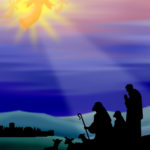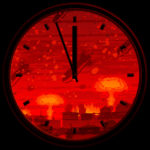-
For God so loved….
– John 3:16
Holidays are a set up for disappointment.
My mother used to say the only thing holidays were good for was to set people up for hurt and disappointment. It seems cynical, but unfortunately, it’s often true. The world’s expectations for these contrived celebrations definitely set us up for a letdown. Life just isn’t as magical as we would like it to be, although marketers want us to think that if we spend enough time, effort, and money, we can achieve it.
Commercialism sets a high bar: If we don’t buy the perfect gift to create a magical moment, or if we aren’t the perfect spouse, child, or parent on those special days, we are losers. So we spend the money, buy the stuff, and swallow down the sour taste the emptiness leaves in our mouths.
It’s never enough. Things can’t make us feel loved.
I will be the first to claim Loserhood. I am nothing without God. He doesn’t see me as a loser, thankfully. He sees me as a sinner; His beloved lost creation; a dear child needing a Father.
Jesus Christ came to give us the perfect gift: Himself. For a tired, hurting old world, He offers an eternal and supernatural love. In Him is the sweet taste of life. In Him, we can enjoy an existence that looks heavenward.
This world offers the rose but pierces the hand reaching for it. God offers a love that is pure, beautiful, and tender. If we trust in Him, we will never be disappointed.
One day of each year we honor the idea of love. Every hour of every day of the year, God demonstrates to us His exquisite love through His Word, His people, His creation, and His Spirit. Eternity won’t be long enough to tell Him thanks and give Him our hearts.
He is the rose without thorns.

-
For we know that if the earthly tent which is our house is torn down, we have a building from God, a house not made with hands, eternal in the heavens.
– 2 Corinthians 5:1
He pulled into the nursing home parking lot with a heavy heart.
He opened the mechanical door and it engaged, swinging wide. Inside, the usual nursing home smells met him as he made his way to his mother’s darkened room. The curtains were pulled, and a deep silence shut out the sounds in the hall.
She was nearly ninety-one years old. The wreath of white hair framing her frail face belied her fierce nature and the long battle she had waged to live. She appeared to be sleeping, but her gnarled fingers picked at her sweater as if to straighten it out across her swollen belly.
He stood for a moment, debating whether to awaken her. He decided against it, prayed a quiet prayer over her, and tiptoed out of the room.
Less than an hour later, he received the call she was dead.
Nearly two weeks ago, we buried my mother-in-law, remembering her life with tears and reminded we never know what hour will be our last.
Most of us struggle to come to terms with our mortality. Some of us dread suffering. Others are tormented by the fear there is nothing beyond the grave.
The Apostle Paul was a tentmaker by trade. It was common for the nomadic people of the Middle East to live in tents at the time the New Testament was penned. In 2 Corinthians 5, Paul uses the imagery of tents to help us understand the nature of the physical body and immortality.
Our bodies, Paul tells us, are tents, like those portable dwellings we take with us on trips. They are built for travel, so they are lightweight—at the expense of durability. They offer some shelter against the elements, but they can’t protect us against all threats.
We live in tents. But we are not the tent. We’re just using the shelter until we return home.
From the outside, the tent is the only thing we see. When we move on, we leave the shell behind. It can be burned or buried or preserved, but it is only what’s left of the flimsy dwelling we used while we were here. If I came across an empty tent in one of our beautiful national parks, I would just assume the owner was elsewhere.
Not dead; just absent.
Living in a tent is not a comfortable existence. Paul acknowledged “while we are in this tent we groan, being burdened, because we do not want to be unclothed but to be clothed, so that what is mortal will be swallowed up by life.” (2 Corinthians 5:4) Because we have never seen anything other than the outward shell, we question and fear what lies beyond our physical bodies.
He is; we are.
Christ’s death and resurrection redeemed those who love Him from judgment, assuring us that death is not annihilation but a temporary separation. He is the great and eternal I AM, and we are made eternal in His image.
While you dwell in this tent, be encouraged that you are more than what is seen. In fact, you are.
The last enemy that will be abolished is death.
– 1 Corinthians 15:26

-
When the Lord saw her, He felt compassion for her, and said to her, ‘Do not weep.’
– Luke 7:13
The widow shuffled behind the men who carried the body of her only son.
Despair gripped every line of her face. Her thin shoulders sagged under the weight of a life without hope.
Gone were the desperate prayers for God’s healing. Silenced were the frantic petitions, the faith in deliverance, the hope God would rescue them. There was only the sound of shuffling feet and a mother’s soft sobs as the procession made its way to the burial grounds.
Near the gate of the city, they encountered a group of people. A man in rough clothing emerged from the crowd and approached the woman.
She stiffened at this invasion of her grief. What did he want?
It was His voice that captured her attention. He only spoke a few words, but they stirred an undefinable longing in her soul.
“Do not weep.”
Do not weep? Was he blind? It was long past time for hope. There was nothing left but to grieve.
Then the man touched the coffin. According to Jewish law, the mere act would make him ceremonially impure for a time. He didn’t seem to care.
The next moment, it didn’t matter.
The dead man sat up and spoke.
In a single moment, life leapt from the grave. A man’s life was restored. A woman’s joy was resurrected. It had nothing to do with her faith or her good deeds. It was not because she said the right words or believed in a miracle.
It was, we are told, because the Lord Jesus Christ had compassion on her. He was touched by her grief, moved by her sorrow. In her moment of greatest loss, in an hour all hope was gone, God revealed His life-giving power.
Little did she know Jesus would soon be the son carried to the tomb, His own mother the grieving widow.
No one understood He was the Son born to die for their sins. He would not only rise from the dead under His own power, but He would break the hold of death forever for those who love Him.
When we encounter crushing trials, it’s tempting to believe we can call down a miracle if we incant the right prayers, keep a positive confession, or impress God with our faith. The truth is God can’t be manipulated. When He doesn’t answer a prayer in the way we want, it isn’t because we haven’t said the right words.
It’s because He’s God. He is sovereign Lord. His goal is our highest good. He often appears to leave us alone in our sorrows, only to come with power in an hour we are most broken, most lost, most hopeless. Along the way He has purified our motives, torn down our pride, and taught us the priceless lesson of trust.
You may be standing at the grave of something or someone very precious. Take heart. The Lord Jesus is here. He sees your heartache. He’s the God of compassion.

-
So the LORD said, ‘I have pardoned them according to your word; but indeed, as I live, all the earth will be filled with the glory of the LORD.’
– Numbers 14:20-21
It’s been a tough day in God’s world.
The images from television and Internet have been especially sobering. Across the planet, hate reverberates across the airwaves as man’s inhumanity to man intensifies.
There’s only so much a person can take. On a day like this, it’s easier to turn away than to watch the carnage. Post a recipe on Pinterest. Go shopping. Shut out the darkness.
Sometimes the silence from heaven itself seems deafening. Can’t God see what is happening? Doesn’t He care about the innocent men, women, children, and animals being destroyed every day? Where is God as the earth plunges toward destruction?
In Numbers, we are told the people of Israel had barely been delivered from the Egyptians when the complaining began. As they stood on the brink of the Promised Land, they feared the giants in the land more than they trusted God. So they plotted rebellion.
This breach of trust provoked God so much, He threatened to destroy them and start over with Moses. Moses interceded successfully in their behalf, but not before we are given a glimpse of the tremendous effort with which God holds back His hand from judgment.
God really cares about us. His great heart is broken by the wickedness He must endure every day. He longs to end the conflict and see justice reign on earth. It would only take a word.
But He waits.
His patience is seen as indifference. His long-suffering is viewed as impotence. His silence is interpreted as nonexistence.
And still, He waits.
He waits because it gives Him no pleasure to destroy His creation. He longs for His lost world to understand this. He reaches out to us with the gift of life.
Think He doesn’t feel our pain? Look at His hands.
Don’t be discouraged by what you see happening around you. The day is coming when all the earth will hear His voice. He has sworn by His own name that in that day, the earth will be filled with His glory. He will wipe our tears away, and justice will reign.
Until then, believe God cares about the suffering. He is at work in our lives, healing and strengthening and comforting all who cry out to Him. With us, He yearns for the day when His glory is released.
With Him, we wait.
But You, O Lord, are a compassionate and gracious God, slow to anger, abounding in loving devotion and faithfulness.
– Psalm 86:15

-
But the wisdom from above is first pure, then peaceable, gentle, reasonable, full of mercy and good fruits, unwavering, without hypocrisy.
– James 3:17
James D. Watson, the co-discoverer of DNA and a Nobel Prize winner, was an avowed secular humanist and evolutionist.
In 2007, he ignited a public firestorm for a comment he made to the London Sunday Times. During an interview to kick off a book tour, he said he was “gloomy about the prospect of Africa,” because testing had suggested African intelligence to be inferior to European intelligence.
This was just one of the scandalously racist comments made by the scientists. His words brought public opinion howling down upon his head and a brilliant career crashing at his feet. His apology fell upon deaf ears, and he retired from the public eye after canceling his book tour. He was soon relieved of his job as chancellor at the Cold Spring Harbor Laboratory.
The debacle was schizophrenic for a society generally accepting of the evolutionary model of creation.
As an evolutionist, Watson was only taking evolution to its natural conclusion. If life came into being through a series of random actions over the course of eons, then species should exhibit an unorganized collage of form and function.
If intelligence is simply a by-product of cell mutations, certain groups of cells could arguably have evolved into higher functioning beings than others, even within species, thus creating classes of Homo sapiens. This is the social Darwinism upon which the Nazis based their delusions of grandeur and systematically destroyed those of supposedly inferior evolution: Asians, Slavs, Jews, Africans, Gypsies, the disabled, homosexuals, the homeless, alcoholics, Christians.
In contrast, the concept of the equality of mankind is rooted in the belief we are all created in the image of God and equal in His sight. This ideal elevates humanity from an animal existence and opens a world of opportunity for people of all nations and abilities.
The apostle Paul warned in 2 Timothy 3:7 of those who are “…always learning and never able to come to the knowledge of the truth.” Proverbs reminds us, “The fear of the LORD is the beginning of knowledge; Fools despise wisdom and instruction.” (Proverbs 1:7) and “The LORD gives wisdom; From His mouth come knowledge and understanding.” (Proverbs 2:6)
Wisdom doesn’t begin in the head but in the heart. Unless we acknowledge our Creator, we can spend a lifetime learning, and yet never understand who we are.
Know that the LORD Himself is God; It is He who has made us, and not we ourselves.
– Psalm 100:3
Photo courtesy Erik Thorson

-

-
And suddenly there appeared with the angel a multitude
of the heavenly host praising God and saying, ‘Glory to God in the highest,
And on earth peace among men with whom He is pleased.’
– Luke 2:13-14
In Nazareth, one man really appreciated census time.
The innkeeper stepped into the street to get more provisions for his guests. It was alive with the sounds of the evening as travelers clogged the market. Cranky mothers scolded crying children and men hurried to get their animals fed and watered. Makeshift camps sprung up after every possible lodging was filled.
He rubbed his hands together in contentment as he thought of the extra money he was making. The crush of people was an annoyance, but the census had turned out to be great for the area businesses. His inn was full.
He was just stepping back inside when he was approached by a stranger leading a donkey, upon which sat a very young pregnant woman. He quickly rebuffed the man’s inquiry about a room for the night. He had to get back to his guests.
Then he glanced over at the girl. She was in obvious pain. A twinge of guilt pricked him. There was the stable, if they didn’t mind sleeping with the animals. He quickly closed the door on them and the sense of emptiness that soured his stomach.
Through the night, the young Jewish woman labored to deliver her King, her cries drowned out by the cacophony in the street. Then as Bethlehem finally slept, a new, small sound filled the stable as the Child took His first breath from inside His creation.
It was the sound of the Life-giver joining His world.
In the sweet darkness of the night, in the stillness of the Eternity that dawned, the shepherds heard the triumphant sound of a party in heaven.
In all the earth, they alone saw the splendor.
The lowly heard what the mighty missed. Kings were blind and deaf. Wise men beheld the glory from afar. In the whole wide world, it was those keeping lonely vigil over the sheep who heard the angel voices.
What a sound it must have been! What an honor to witness such praise! Wonder of wonders, that men should hear the songs of heaven.
Wonder of wonders, He reaches through the ages and invites us to sing along.
Fall on your knees
O hear the angel voices!
O night divine!
O night, when Christ was born!

-
But Jesus said, ‘Let the children alone, and do not hinder them from coming to Me;
for the kingdom of heaven belongs to such as these.’
-Matthew 19:14
Christmas is for children, just like salvation.
We started celebrating Christmas early the year our daughter flew out with her family for the holidays. Long before Thanksgiving, we were planning events and buying gifts. Christmas mingled with—and finally pre-empted—the turkey and harvest, creating a manic mix of fall colors and jingle bells. Competing Christmas songs played on opposite sides of the house, and we watched a gaggle of Christmas videos—sometimes twice.
Perhaps we were a tad over-zealous that year. But after years of disappointments and heartaches, it just felt good to have an excuse to celebrate.
Christmas is my favorite holiday most any year. I nearly always overdo it, and here is a part of the season I always put away with a sigh.
It’s the child in me, the one who never grew too old to believe in miracles. The older I get, the more I miss the wide-eyed little girl who lay awake most of the night listening for sleigh bells and who bounced out of bed before first light to run breathlessly to the tree.
I miss running in bare feet on cold floors, eating guiltless plates of cookies, playing outside in the snow until my toes were numb, and not knowing that drinking homemade eggnog could make me sick.
I especially miss believing that the golden glow of the season is real.
Somewhere along the way, the child in me got trampled, starved, and seriously sick. She grew too sad to dream or let hope out to play. Somewhere along the way, a tired cynicism replaced the wonder.
Somehow, the child grew into an old woman.
That won’t do anymore. This Christmas, I opened my present early. I found the box my heart had been hidden in. There she was: an innocent babe locked in the stinking barn of this world, a precious child of faith.
Oh, those trusting eyes! See how she reaches for her Father! What a gift from God!
She has waited so long for me to come for her. I want to hold her close and never let her go.
I think I’ll name her Joy.
O holy Child of Bethlehem,
Descend to us, we pray;
Cast out our sin and enter in,
Be born in us today.
“O Little Town of Bethlehem”
Phillips Brooks
-
Let the peace of Christ rule in your hearts, to which indeed you were called in one body; and be thankful.
– Colossians 3:15
In a holiday season careening out of control, I long for the Deliverer whose arrival we celebrate.
It happens every year.
I begin the holidays with a fresh thrill of expectation as we haul out the Christmas decorations shortly after Thanksgiving. Every year I start a bit earlier, try harder, and still fall short of completing everything on my to-do list.
The list hasn’t gotten longer. Other responsibilities in my life have grown.
I start with good intentions. But as the month spins increasingly out of control, my energy begins to wane along with my Christmas spirit as I strain to capture all that glitters in the magical world dangling just out of reach.
That world doesn’t exist, not in this life. At times it even taunts me and magnifies the year’s sorrows. Our lives pale beside the delusion. The contradiction cuts as I dash through the last bell-ringing days of a tired year.
When I reach that moment of total frazzled-hair, wild-eyed insanity; when I don’t have time for a walk through the mall with my husband, for a run to Starbucks to meet friends for coffee, or to sit with the cat in my lap and enjoy the Christmas tree, I need a time-out.
At that moment, it’s crucial to put the recipes away, close my eyes to the mud on the kitchen rugs, and sling out a net to gather in my mood swings.
Because I love Christmas. I love celebrating the day my Deliverer came for me. It’s the real miracle breathing life into the season, salvation appearing out of the sky to a world dying to live.
What better reason could there be to celebrate? What tinsel-town light show can compete with such glory?
Jesus presents to us the ultimate good-versus-evil story. He’s the Prince on a white horse who comes just time to save His beloved. He has written the beginning and ending to every life’s drama, and He is the only real reason life is worth living.
His coming split history in half and lit up the skies with angelic alleluias. His death and resurrection made our every loss bearable, our every breath a gift, and our future secure.
Because He came, every day is Christmas. That deserves a serious celebration. Forget the mincemeat pie. The Christmas cards can wait.
Rejoice.

-
Every day, the church is becoming more like the world it allegedly seeks to change. – George Barna
How we live influences others as they make decisions that will walk them into eternity.
When Graham Cyster was smuggled into a Communist cell of young people fighting apartheid in South Africa, he was eager to share his faith with them. They were hoping for an alternative to the radical philosophies they embraced.
Cyster presented the gospel of Jesus Christ to his listeners. He told them that faith in Christ transforms people and inducts them into a body of believers in which there is neither Jew nor gentile, black nor white, male nor female, rich nor poor.
The young people listened raptly. One young man said, “That is wonderful! Show me where I can see that happening.”
Cyster was caught off-guard. He admitted he could not think of one place in South Africa where that was truly being lived out by believers. “Then the whole thing is a piece of sh—,” the young man spat in contempt. He later died in the fight against apartheid without ever knowing Christ.*
Most of us rarely get such a glimpse of the brutal realities of the spiritual war that wages around us. What we say and do is too often all about us. We forget that how we live influences others as they make decisions that will walk them into eternity.
Without the power of a changed life, Christianity becomes just another alternative lifestyle. True Christianity isn’t a philosophy, a set of rules, or a positive force to guide our lives. It’s radical, life-changing, demanding. It’s stepping out of slavery to the devil into servanthood to God.
The chains have been replaced with bonds. We serve Him, not to get saved, but because we have been saved.
Whether or not we acknowledge it, we are ambassadors of a higher kingdom.
We wear Christ’s brand, and people are watching. They hope to see something supernatural. Something real. Something worth living for.
What are we giving them? How are we representing the kingdom of God to a world dying to know? If our actions turn them away from a living faith, is their blood on our hands? Do we care enough to live salvation out loud in our words and actions?
As obedient children, do not be conformed to the former lusts which were yours in your ignorance, but like the Holy One who called you, be holy yourselves also in all your behavior; because it is written, “YOU SHALL BE HOLY, FOR I AM HOLY.” -1 Peter 1:14-16
A life of holiness isn’t about following the rules. It’s about being ruled by Christ. We may be the only face of the Savior others ever see.
Holiness matters.
*from The Scandal of the Evangelical Conscience
Why don’t Christians live what they preach?
By Ronald J. Sider
-
So then it does not depend on the man who wills or the man who runs,
but on God who has mercy.
– Romans 9:16
The futile race to the top
He sits on a riding lawnmower as he trims the lush green lawn around his house. In this old commercial for a finance company, the owner sports an overdone grin as he recites his many achievements for the camera: a four-bedroom home; wife and kids; a great job; membership in the local country club; a pool.
In the next breath, plastic smile firmly in place, he confesses he can barely pay his finance charges. He begs, “Will somebody please help me?”
The pressure to perform begins early for most of us. The race for the first word, first teeth, and first steps is soon followed by pre-school, dance classes, swimming lessons, and sports. By the time we’ve finished high school, we’re supposed to be well on the way to a successful career.
The incomes have to be better, the homes bigger, the resumes fatter. Keep working. Keep ahead of the competition.
Keep scaling the ladder of success.
We squander the treasure of our youth clawing upward rung by rung, only to make a bitter discovery at the end of our lives: The ladder leads nowhere. In the final years we are left to face the oblivion of old age and death.
Thousands of years ago, a young man was on a similar journey. Sent by his parents back to his ancestral home to find a wife, Jacob travelled alone until dark. Knowing he would have to spend the night under the stars, he found a stone and used it as a makeshift pillow.
That night he had a strange dream. In this dream a ladder was set on the earth. Its top reached into heaven. Angels were using this ladder as a highway from heaven to earth. God stood at the top of the ladder and proclaimed a blessing to Jacob and his descendants. In awe Jacob called this place the house of God and the gate of heaven.
Jacob went on to have a couple of marriages, lots of kids, and more than his share of trouble. God established an entire nation of people through him before he returned to the dust.
The dream lay in obscurity for thousands of years, until it was interpreted one day by a carpenter.
Not just any carpenter, Jesus was a different kind of builder. He worked with wood, but He came to be the ladder to heaven’s gate, spanning the gulf between heaven and earth.
Jesus answered and said to him, “Because I said to you that I saw you under the fig tree, do you believe? You shall see greater things than these.” And He said to him, “Truly, truly, I say to you, you will see the heavens opened, and the angels of God ascending and descending on the Son of Man.”
– John 1:50-51
Because we all die, the ladder to success is a one-way trip to oblivion. The only ladder that matters is the one reaching eternity. Religion is the vain effort of man to bridge the gap between him and God. Religion ends in the cry, “Will somebody please help me?”
Only in the person of the God-man Jesus Christ is the void bridged between heaven and earth. His body, offered in sacrifice for our sins, became the holy stairway to heaven for which we long. With Him, we can leave the futility of this world behind. In Him we find the gateway to eternity.
In Him, an old dream becomes hope for a new life.
But God, being rich in mercy, because of His great love with which He loved us, even when we were dead in our wrongdoings, made us alive together with Christ (by grace you have been saved), and raised us up with Him, and seated us with Him in the heavenly places in Christ Jesus, so that in the ages to come He might show the boundless riches of His grace in kindness toward us in Christ Jesus.
– Ephesians 2:4-7

-
Now the Philistines took the ark of God and brought it from Ebenezer to Ashdod. Then the Philistines took the ark of God and brought it into the house of Dagon, and placed it beside Dagon.
– 1 Samuel 5:1-2
Do we live as if God is a token deity in the pantheon of belief systems?
From the waist up, Dagon was a man. From the waist down, he was a fish. This burly “merman” was the god and protector of the sea-faring Philistines.
Shortly after the young Israelite Samuel became a prophet of the Lord, Israel went to war with the Philistines. The Philistines defeated the army of Israel and took the ark of God in triumph. They placed it in the temple of Dagon as a symbol of the merman’s power over the God of the Israelites.
They were about to learn a critical lesson: The ark of Israel wasn’t just a trinket in the march of the gods. And the God of Israel wasn’t just another token deity in the pagan pantheon.
As the sounds of celebration waned in the hours after the battle, night settled over the Philistine city of Ashdod. Within the dark interior of the temple, in the stillness, there was a stirring.
Then there was a thud.
The next morning, the Ashdodites found Dagon on his face before the ark of the Lord. They assumed he fell over and set him back up in his place.
The next night was again shattered, this time in a crash as the stone fell before the breath of God.
Early in the morning, the Ashdodite worshippers arrived at Dagon’s temple to find him on his face before the ark. This time, his head and hands had broken off on the temple threshold when he fell. The implication was clear. This was a vanquished enemy.
Soon a deadly outbreak of boils fell upon the entire city’s inhabitants. Trembling, the Philistines quickly returned the ark to Israel. Their merman was no match for the God of Israel. Their god was the creation of their own hands. The God who watched over Israel was real.
You are the greater temple, in whom dwells the living God.
Is your enemy tormenting you today? Does it look like there is no deliverance for you? Do you wonder if your prayers fall upon deaf ears? Does it feel as if the devil parades your failings before the world?
Take heart. You have not come to the temple of the merman, nor even to the old temple of God. If you have surrendered your life to the Lord of Lords, you are the temple of the living God. He hears your prayers. He is real, powerful, and very much alive.
But you have come to Mount Zion and to the city of the living God, the heavenly Jerusalem, and to myriads of angels, to the general assembly and church of the firstborn who are enrolled in heaven, and to God, the Judge of all, and to the spirits of the righteous made perfect, and to Jesus, the mediator of a new covenant, and to the sprinkled blood, which speaks better than the blood of Abel.
– Hebrews 12:22-24
Throw your trust on Him today. Walk in His righteous and toss away your idols. Listen for His voice. He is speaking; and He says this:
There is only one God. And He is mighty.
Behold, the LORD’S hand is not so short
That it cannot save;
Nor is His ear so dull
That it cannot hear.
-Isaiah 59:1

-
I will never desert you, nor will I ever forsake you.
– Hebrews 13:5
Failure is a human condition.
One month ago she climbed a silo at an abandoned concrete plant and jumped to her death. Before that day, twelve-year-old Rebecca Sedwick endured nearly a year of bullying by as many as fifteen girls in attacks that began at school and continued online after Sedwick’s parents removed her.
There had been warning signs. Last December, she was hospitalized after slitting her wrists. People knew she was sad. Her death and others like it have led to a rush of community soul-searching. Her mother wrote a birthday message on what would have been Sedwick’s thirteenth birthday, saying, “I feel like I failed….” *
Don’t we all? Every day and in many ways? We’re just flesh and blood; clay houses for the soul. We regularly fail ourselves; our God; each other.
Because we live with failure every day, it’s hard to comprehend a Father who never fails. Because we are guilty of desertion under fire, we can’t fathom a God who has promised to fight for us. Because we don’t understand His ways, we struggle to trust Him in the desperate hours when He seems to have abandoned us.
Have you prayed to God fervently, only to be met with silence?
Do you live with unremitting pain? Does it feel like nothing ever changes for the better?
Do you feel utterly alone in your crisis?
Jesus knew what it felt like to be forsaken.
At His execution there was no place for Him in either heaven or earth. On the cross He hung utterly alone, the object of the full wrath of God. It was not because His Father wanted to hurt Him, but because Father and Son and Spirit knew it was the only way to spare you.
Bloodied, bruised, and dying, covered with the filth of a billion sins, Jesus cried out:
My God, my God, why have you forsaken Me?
That is why you can never be forsaken by God. That possibility was taken away when Christ accepted God’s wrath upon His own head, borne out of His great love for you.
Because we live in a fallen world awaiting the final redemption, we still have sorrow. Life will be filled with trials as we complete our pilgrimage to the holy city awaiting us in heaven. God has promised that for those who accept the sacrifice of Christ, hardship works for our good, teaching us perseverance and compassion for others.
This should inspire us to reach out to those we see suffering in silence around us. No person should live without knowing the comfort of the Holy Spirit. It is up to us, His hands and feet and heart, to reach out with His love to those like Rebecca who are hurting today.
You are not forsaken. God has written this in His blood. Accept this, trust in His faithfulness, and share His comfort with others as you await the day you fully understand why.
*http://www.cnn.com/2013/10/20/justice/rebecca-sedwick-bullying-death/index.html

-
Look at the ships also, though they are so great and are driven by strong winds, are still directed by a very small rudder wherever the inclination of the pilot desires. So also the tongue is a small part of the body, and yet it boasts of great things.
– James 3:4-5
Life and death are in the power of the tongue.
Some time ago, the week’s news was dominated by the revelation of the public verbal slip-up of a well-known politician. A botched speech at a university lit up the talk radio phone lines for days, evoked ridicule from both sides of the aisle in Congress, and sent the senator beating a hasty retreat home in shame.
As his grand ship of ambition crashed against the cruel rocks of media scrutiny, he was left to watch his dreams fill with water and turn belly-up in the foam left by the furor.
The storm of protest he inadvertently created centered around one Freudian slip of the tongue. No matter whether a person cheered or lamented this man’s political demise, the implication is sobering. Most of us don’t have the world’s spotlight on our every word, but we are all one sentence away from destruction at any time.
Words are powerful. Words hold the power of life and death. Words can kill, and words can raise the dead. The world itself was spoken into being (Genesis 1). With a word it will end (Revelation 19:21).
Rarely do we understand the power of our own words.
Our words reveal our hearts:
The good man out of the good treasure of his heart brings forth what is good; and the evil man out of the evil treasure brings forth what is evil; for his mouth speaks from that which fills his heart.
– Luke 6:45
The book of James devotes an entire chapter to the power of the tongue, comparing it to the little rudder of a ship. Just as the course of a huge vessel is directed by a small rudder at the order of the pilot, so we direct the course of our lives by our speech. As the pilot commands the rudder, we command our tongues, either allowing them loose rein or steering our way carefully away from treacherous reefs and toward safe harbor.
Since we all “stumble in many ways,” the safest course is to follow the leading of the apostle Paul in presenting our bodies a living and holy sacrifice, therefore allowing God to be the Captain of our vessel, the Master Pilot of our journey. In that way, we live each hour under His control, weathering the storms safely and finding grace when we veer off course. Then His words become ours; His mercy is poured out through us to others.
If we immerse ourselves in the love of God and His truth, it can’t help but become the storehouse of our hearts to guide our lives and season our speech with grace.
The tongue of the righteous is as choice silver.
-Proverbs 10:20

-
In the last days mockers will come with their mocking, following after their own lusts, and saying, ‘Where is the promise of His coming? For ever since the fathers fell asleep, all continues just as it was from the beginning of creation.’
– 2 Peter 3:3, 4
There is blood in the streets, in the homes, in the land.
During the twenty-year-old war in Syria, more than 100,000 people have died, and over 2 million Syrians have fled to nearby countries. There appears to be no hint of resolution as the region rages with hate.
In the neighboring countries, believers living there share what they have with the refugees. Teams of Christians share medical supplies, spiritual help, and the Gospel with the displaced Syrians.
They used to be called “infidels.” Now they are often referred to as the “Bible People.”
Despite the dangers of being a Christian in these countries, these persecuted people continue to faithfully reach out to the hurting. Because of their faithful witness, thousands of Muslim refugees have accepted Christ as their Savior.*
The Lord is not slow about His promise, as some count slowness, but is patient toward you,
not wishing for any to perish but for all to come to repentance.
– 2 Peter 3:9
In the heart of Africa, the Lemba Tribe practices ancient rituals. Their skin is black, but DNA testing has confirmed this tribe in Zimbabwe to be descendants of the priestly Jewish tribe of Levi. Jewish Voice Ministries International reports that through their medical clinic outreach, more than 5,000 members of the Lemba Tribe have become believers in the last year, embracing Jesus as their Messiah.**
This gospel of the kingdom shall be preached in the whole world as a testimony to all the nations, and then the end will come.
– Matthew 24:14
Around the world, we see the brutal evidence of dark forces at work.
But our favorite news show probably won’t report the great harvest being brought in at this midnight hour. Christ is still about His Father’s business, the Head and great communicator to millions of cells who are His hands and feet, hard at work establishing a kingdom of hearts united in praise to the Creator.
And what a harvest it is! What a bountiful return on the investment of God’s Spirit to His fields!
Sometimes it feels like Jesus Christ will never come back for us. Believers have hoped for over two thousand years to see His beautiful face, to hear the cry of victory announcing His return. His apparent slowness is not because He doesn’t care, but because He loves the world so much, He hates to send anyone to destruction.
So He labors in those white fields, bringing in all who will come before the door closes forever.
The fields are white. The harvest is in full swing. The end is coming.
*From information provided by Voice of the Martyrs.
**From information provided by Jewish Voice Ministries International

-
Do not judge so that you will not be judged.
– Matthew 7:1
Do you not know we will judge angels? How much more matters of this life?
– 1 Corinthians 6:3
It’s been a long day. I finally flop down on the sofa, turn on my favorite sappy TV show, and tell my family with a wink, “Don’t judge me.”
Some days later I’m on the phone trying to work through a difficult and dangerous situation that touches my life. The person on the other end of the line dismisses my concerns, telling me, “I’m not going to judge.” The understood subliminal message: Like you are doing.
Judge is a word cloaked in daggers. It evokes visions of stern-faced men in powdered wigs and black robes. Its mere mention is accusatory, heaping suspicion on anyone who risks asking a question.
How many times have you heard the words of Jesus in Matthew 7:1: “Do not judge”?
How often has someone quote these words of Jesus from John 7:24: “Do not judge according to appearance, but judge with righteous judgment”?
How do we reconcile the two?
For one thing, it’s helpful to realize the New Testament uses different Greek words for the word judge.
Krino speaks of a judgment brought in by an officer of the court, and therefore an official pronouncement.
Anakrino means to “examine, investigate, question.” *
Diakrino refers to using discernment.
Today the word judge has come to mean “condemn.” But there is so much more to judging than that. In Christ, God has granted us the authority to correctly decide the affairs of men in this age in preparation for the age to come. We are commanded to question, examine, investigate, and discern the spirits behind the events in our lives. We are to conduct ourselves in wisdom, speaking the truth without condemnation.
God’s the ultimate Judge. His judgments will not only to put an end to evil, but they will reward those who received the King’s ransom for their sins, escaped the punishment they deserved, and served their Lord with passion. Until then, the job of those who follow Jesus is to practice discernment and extend the grace so hard won by the Savior.
Question. Investigate. Discern. Seek out the truth. Save the pronouncements for the ultimate Judge.
Therefore do not go on passing judgment before the time, but wait until the Lord comes who will both bring to light the things hidden in the darkness and disclose the motives of men’s hearts; and then each man’s praise will come to him from God.
– 1 Corinthians 4:5
*Taken from Vine’s Greek New Testament Dictionary http://gospelhall.org/bible/bible.php?search=anakrino&dict=vine&lang=greek

-
When there is no light by which to read the music, those who know their God by heart play on.
–Joni Eareckson Tada
She sat on a stage at a large conference in the Philippines, excited to be in that exotic country.
Quadriplegic artist and disability advocate Joni Eareckson Tada enjoyed the musical performance of a band of Filipino musicians as heavy rain typical of the monsoon season fell outside the huge hall.
Suddenly, as Mrs. Tada relates in her book, A Place of Healing, the boom of thunder shook the place. At the same moment, the entire hall went dark.
Unfazed, the musicians continued to play. It didn’t matter to them that there was no light by which to see the score. They knew the music by heart.
This group of musicians were blind.
They must have invested many hours of practice in order to play an instrument in the first place, and even more to be able to play together in a band. They had to learn the music by ear, since they could not read it for themselves. They had to listen carefully to each other. It must have taken great discipline and a true love for music.
They hadn’t prepared specifically for a blackout.
Learning the music by heart was the only way they could play, given their limitations. But it made them ready for any eventuality. Nothing could take the song from them.
Too often I count on yesterday’s light for each new day. When I get blindsided by unexpected trials I find myself panicking, instead of trusting in the score written on my soul.
What storms assault you today?
Have you ever felt stranded in the dark by unforeseen circumstances? How can any of us live above the shadows that threaten to still our faith?
It’s simpler than we think.
When the world crashes in, sit in His presence. Quiet your mind. Listen for the music playing in your spirit.
There it is! Can you hear it? See, you know the words. It’s the Song of the Redeemed.
When the storms thunder around you, the rain falls, and your world is smothered in darkness, you know what to do.
Play on.
And they sang a new song, saying, ‘Worthy are You to take the book and to break its seals; for You were slain, and purchased for God with Your blood men from every tribe and tongue and people and nation.’
‘To Him who sits on the throne, and to the Lamb, be blessing and honor and glory and dominion forever and ever.’
– Revelation 5:9,13

-
Your ears will hear a word behind you, “This is the way, walk in it.”
– Isaiah 30:21
The jet-black night was alive with intense pinpoints of light that mocked the beam from my husband’s flashlight.
It was dark, and we had taken the challenge from our daughter, son, and daughter-in-law to get our feet wet in the restless waves teasing the beach outside our vacation home.
I followed closely behind my husband as he led the way on the narrow path through the beach grass. My aging legs groaned as I dug my heels into the deep sand and pushed forward.
We broke out into the open expanse of beach. The moon was a red sliver hanging in the sky. The ocean’s roar beckoned from somewhere far ahead of us. I drew a large arrow with my foot in the sand to point the way to the beach house, and we walked on.
We finally hit wet sand and skittered through little pools of sea water. The sand was teeming with some sort of hopping insects.
Onward we walked toward the sea, a bit more cautiously now. Where was the edge of the water?
A chill ran through me. I looked back toward our beach house. The lights had disappeared behind a sandy berm. The town lights seemed distant against the hulking, forested hills we could not see but knew were there.
Still we walked. Sky and water and land melded into a vast void. We were very far out from the high tide mark. The only sound was the deafening waves.
I stopped, suddenly afraid.
A newspaper headline popped into my head: TRAGEDY AT THE BAY: TOURISTS SWEPT OUT TO SEA.
By this time, my husband was having second thoughts, too. We conceded defeat and trudged the long walk back to the beach house. It was a relief when our flashlight found the arrow in the sand marking the correct path through the beach grass.
We never did get our feet wet in the waves that night. But I was reminded just how easy it is to lose sight of my boundaries and the importance of knowing the way home.
People often think the Bible is a book of rules. Humans hate to be told what to do. We love the thrill of walking the edge of danger. Because we live in New Testament times, the age of grace, it’s tempting to fudge the standards set forth by God’s Word. He’s already forgiven us, right? Wasn’t it all settled at the Cross? Aren’t we really free?
So we flaunt God’s mercy. We plunge ahead with the light we have. We ignore the boundaries.
Then one night the darkness threatens to swallow us whole.
God’s Word is not a set of regulations to keep us in line. It’s the ship coming to rescue us from the deep. It’s the beacon in the storm, the light directing us past the shoals to safety.
It’s a word behind you saying, “This is the path.”

-
Blessed are those who hunger….
–Matthew 5:6
His eyes are icy blue pools in a sea of brown mink.
His long teeth protrude slightly from under his upper lip, reminiscent of some distant saber-toothed relative. He purrs softly as he rubs his nose against my hand in a blatant bid to be petted.
I run my hand along his back and wince. His backbone is a jarring reminder of his recent health struggles. I can’t get our aging Siamese cat to eat and it’s driving me crazy. We’re hoping more tests at the veterinary clinic will diagnose the problem.
We love him so much. He’s been such a wonderful companion that it kills me to see him grow this gaunt. He looks like he’s survived his own personal holocaust, and I don’t know why.
Do I look like that to God?
Does it hurt Him to see me lurch along the dry valleys without cracking open the Bible, trying to live on yesterday’s meal? I sense the gnawing inside me, but I’m too distracted by what’s happening in my world to recognize the hunger.
God is urgently calling.
Sin commands the airwaves of my existence in this society. Wickedness flaunts her gaudy dress everywhere my eyes rest, until I look away in embarrassment. Then it gets easier to not bother looking away. I am conquered by the shock and awe of the bombardment, felled not so much by the sins of commission as by one sin of omission.
I haven’t been to the Table.
God is urgently calling.
The Spirit gives me a glimpse of my condition. I’m stunned at the sight. There is little flesh beneath my sagging faith. Then I feel the weariness the battle against my soul has produced. I recognize the raging hunger and thirst.
God is urgently calling.
I’m tired of compromise, fed up with just surviving, and finally listening. The craving is pure in the yearning; holy in the seeking; powerful in the fulfillment. God’s Word corrects my path, cleanses my heart, inspires me onward. He speaks to me gently, like the good Father He is. God never berates me for waiting so long. He simply fills me—rejoicing in my prayer, dancing over my tears of repentance, calling me to lift my empty hands to Him. He is always there, and His provision is abundant.
Why do I wait so long? Are you starving, too?
Blessed are those who hunger and thirst for righteousness,
for they will be filled.-Matthew 5:6 NIV

-
How blessed is the man whose strength is in You,
In whose heart are the highways of Zion!
Passing through the valley of Baca they make it a spring.
– Psalm 84:5-6
The night eased toward early morning.
I tossed in my bed trying to shake off the day’s burdens so I could sleep. I knew sleep wouldn’t come, though.
It’s a rule. Moms can’t rest until their young are back home from wherever they’ve been in the night. I thrashed and prayed in the darkness until I heard the sound of tires crunching up the gravel driveway. With a sigh of relief, I whispered a prayer of thanks.
Shortly the back door burst open and they came spilling breathlessly into the kitchen, shattering the midnight pall that lay over the house. The Christian concert had done a good job of electrifying the group. They were filled up, spilling over. The wave upon which they rode crested and tumbled out ahead, crashing into my ears with the clean sound of pure joy.
In the darkness I soaked in the rush of God’s presence that washed through the house and ebbed into swirling little pools teeming with life. It made me long for more of God.
When did I get so dry?
At a community well over two thousand years ago, a thirsty woman met a man in Samaria who would change her life.
She didn’t know she was parched; it was the tired traveler asking for a drink of water. She was surprised a Jew would talk to a Samaritan. She didn’t dream she was talking to her Creator.
This man didn’t need her to give Him water. He called the first molecules into being by the power of His word alone. He could have commanded rivers to arise at His feet.
Instead, He sat at the well and stayed thirsty. He waited for her, for the moment she would meet her Maker and He would quench her thirst.
Water that is living is on the move. It doesn’t collect in stagnant pools. It erupts to the surface from the Rock beneath our feet, clean and pure and alive.
It’s impossible to be contained. The force of its power brings it upward, outward, flowing onward to renew all it touches.
Those who love the Master are His fountains, conduits from the source to the surface from which the Spirit reaches out to a dying world. It’s His desire that we allow this outflow to be unrestricted, unimpeded, and unashamed of the joy with which it flings itself toward the sky.
Life is our Baca, the valley of weeping. As we pass through the desert we call Life, we will encounter much sadness and shed many tears. But if God’s presence dwells in us, we will leave it a different place, a well-spring of life that will never run dry.
Anyone who believes in me may come and drink! For the Scriptures declare, ‘Rivers of living water will flow from his heart.’
– John 7:38 (NLT)





















